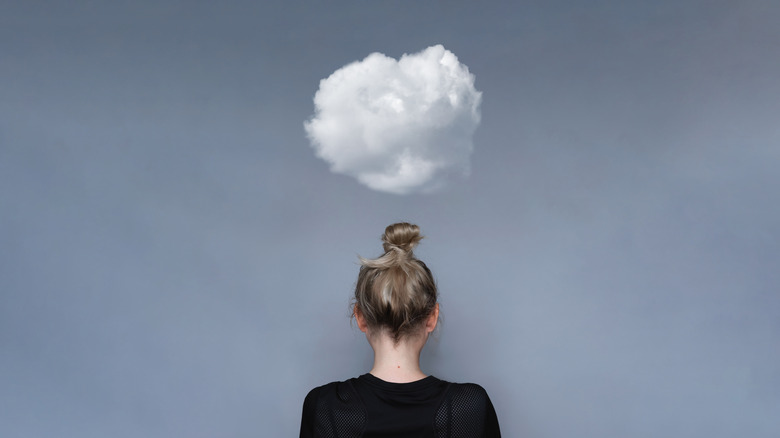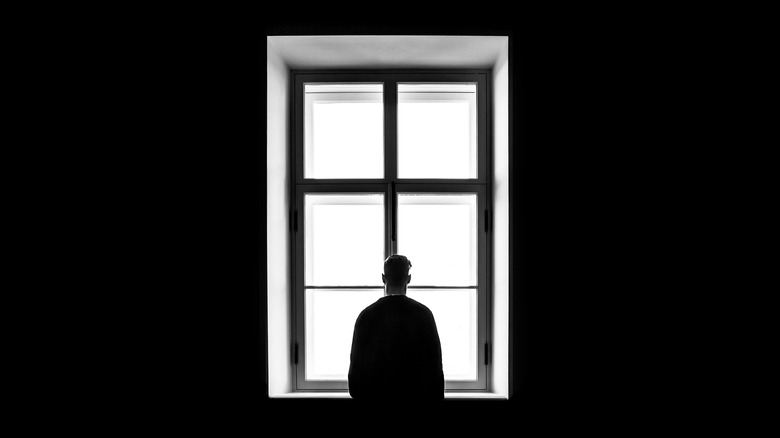When You're Lonely, This Is What Happens To Your Body
Human beings are social creatures by design. Our species evolved through cooperation, say researchers (via Nature Human Behaviour). Yet many people find themselves vulnerable to social isolation, especially under the COVID-19 pandemic. Loneliness has become a global epidemic, despite there being an abundance of ways to interact with each other beyond face-to-face communication (via Brain, Behavior, and Immunity). Our need for contact is perhaps greater than ever before.
Loneliness can affect mental and physical health in various ways, according to research (via Antioxidants & Redox Signaling). People who are lonely have a higher risk of heart disease, obesity, poor immune health, and even death. Living alone or being isolated can be just as detrimental for us as smoking cigarettes. On the other hand, fostering meaningful social networks and a sense of community can help people maintain their well-being (via Psychiatry (Edgmont)). Here are some things that happen to your body when you feel lonely.
You become more sensitive to the cold
Who would have guessed the connection between loneliness and feeling cold? Interestingly, people who feel like they're socially excluded experience a drop in body temperature. In a study published in the journal Acta Psychologica, participants took part in a computer-generated ball-tossing game as researchers measured their skin temperature. The ball was only tossed to certain players, which meant that some individuals were left out of the game. The researchers found that on average, the body temperature of an excluded participant dropped by 0.378 degrees. Even the memory of being rejected by others or feeling like an outsider was enough to give some people the chills, lending a whole new meaning to "giving someone the cold shoulder."
It was suggested that the findings could be due to the effects of social exclusion on the autonomic nervous system: When people feel lonely or ignored, they experience vasoconstriction. This is when the muscles around their blood vessels tighten, causing the vessel walls to narrow in order to conserve body heat (via Haematologica). Studies have also shown that both social interactions and isolation can affect numerous automatic physiological responses in our bodies, such as our heart rate and blood pressure (via Antioxidants & Redox Signaling).
Your brain releases cortisol
When you're feeling lonely, your brain triggers the release of a stress hormone called cortisol (via Psychoneuroendocrinology). This puts your body into "fight-or-flight" mode, activating your sympathetic nervous system: Your muscles tense up, digestion slows down, and blood pressure and heart rate increase, gearing you up to either face or escape a threatening situation (via Harvard Health Publishing).
Low levels of cortisol can help us out in times of need, supplying us with the energy and capacity to deal with stressful experiences. However, too much cortisol over a prolonged period of time may start to negatively affect the body's systems and organs. People who are chronically lonely tend to have elevated morning and evening cortisol levels (via Psychoneuroendocrinology). This can produce various side effects, including hypertension, poor digestive health, a spike in appetite, and a huge dip in mood (via Harvard Health Publishing).
Being part of a community can be a powerful tonic, according to a study from the journal Psychiatry (Edgmont). People who have someone to share their feelings with are less likely to be impacted by the negative effects of loneliness and stress.
Your sleep becomes disrupted
Given that loneliness can shoot up cortisol levels, it's not surprising that people who are lonely tend to have trouble getting some decent shut-eye. Research shows that individuals with strong momentary feelings or daily experiences of loneliness have high cortisol levels upon waking up and going to bed (via Psychoneuroendocrinology). Chronic exposure to cortisol throughout the day keeps your brain in a heightened state of arousal (via Harvard Health Publishing). This can keep you up at night and prevent you from being able to fall or stay asleep.
People who feel lonely often experience sleep problems, including a lack of sleep, disrupted sleep, and poor quality of sleep overall. According to a 2021 study, those who report feeling socially isolated, regardless of whether they live alone or not, are also more likely to report insufficient sleep compared to those who don't feel lonely (via Scientific Reports). And the individuals with the greatest likelihood of reporting insufficient sleep are those who both experience feelings of loneliness and actually live by themselves.
Your cognitive abilities suffer
Feeling disconnected from others can gradually wear away at the brain. This may happen in a number of different ways, according to research (via The Journals of Gerontology). For example, when people feel secluded, they may begin to struggle with depression, neglect their self-care, and feel chronically stressed out –- all of which can contribute to cognitive decline over time.
People who are socially isolated and feel lonely generally score lower on cognitive tests, reports a research review from the journal International Psychogeriatrics. The domains that are usually affected include general cognitive ability, IQ, and the ability to process and recall information. Lonely individuals tend to be markedly slower when thinking about and responding to tasks.
Feeling socially isolated and alone can also affect memory. The study from the Journals of Gerontology showed that older adults with high levels of loneliness had a harder time recalling a list of unrelated words that they'd been asked to learn. Although your memory will naturally deteriorate as you grow older, particularly in the second half of life, loneliness can amp up the speed of this significantly. In fact, according to the study authors, there's been a fair bit of evidence for the potential role of social isolation in dementia.
Your dopamine levels spike
Dopamine plays an important role in the brain's reward system (via Harvard Health Publishing). The neurotransmitter provides us with a sense of pleasure and satisfaction when we do something rewarding and motivates us to seek out the things that feel good to us. Our brains release dopamine when we eat our favorite yummy foods, listen to the songs that we enjoy, or pursue the hobbies and activities that we love. So, it makes sense that when we lack social interaction –- which is generally a pleasurable activity for most people -– can play havoc with our brain's "feel-good" hormone.
According to research, instead of causing dopamine levels to plummet, feelings of loneliness actually trigger a rise in dopamine in the brain (via Frontiers in Behavioral Neuroscience). Some researchers believe that this natural survival response creates a sense of urgency for us to meet our basic needs for connection and belonging. It drives us to desire and actively pursue social interactions and relationships with others.
You may feel less motivated to socialize over time
Research indicates that feelings of loneliness motivate people to seek out more social contacts (via Frontiers in Behavioral Neuroscience). But in some instances, the opposite might be true. Paradoxically, lonely people are more likely to skip social activities and isolate themselves compared to others, according to a 2020 study from Scientific Reports. The researchers found that lonely individuals tend to have more altruistic attitudes; yet, they also report more negative expectations of others, who they perceive as being less selfless or fair-minded. In turn, this perceived mismatch led study subjects to avoid social interaction. In a sense, then, loneliness and social withdrawal are often part and parcel of the same painful cycle. The study authors admit, though, that the causal link between loneliness and social motivation remains unclear and needs more investigation.
Another explanation could be that chronic loneliness makes people feel unworthy of relationships, causing them to shun others and develop fewer prosocial behaviors. A 2022 study suggests that for someone experiencing prolonged isolation, engaging with people may start to feel daunting and overwhelming (via Frontiers in Behavioral Neuroscience). In those cases, the pursuit of social interaction may feel too difficult and less rewarding.
Your immune system is compromised
People who are lonely tend to have higher levels of cortisol in their system (via Antioxidants & Redox Signaling) — and soaring cortisol levels have a massive knock-on effect on many of the body's systems, including immune function, per the American Psychological Association. As expected, this can take a toll on a person's overall health and eventually lead to serious conditions like chronic fatigue, diabetes, and immune disorders.
A study from the Proceedings of the National Academy of Sciences (PNAS) looked at participants' white blood cells, also called leukocytes. These are the immune cells that help protect the body against infectious diseases. The researchers discovered that the leukocytes of people who felt socially isolated showed an increased expression of genes involved in inflammation. And it isn't just people who are physically isolated that suffer from chronic inflammation, notes a 2021 study published in Brain, Behavior, and Immunity. Individuals who struggle with feelings of loneliness despite having other people around can also have higher-than-normal levels of inflammation in their bloodstream.
You may 'crave' social interaction
Isolation and loneliness can trigger social cravings that are very similar to food cravings, according to a study published in Nature Neuroscience. Researchers observed the same part of the brain light up when participants were shown images of people after being isolated for ten hours one day, and images of food after ten hours of fasting on another day. Interestingly, both food and social deprivation activated the same midbrain dopaminergic region. Participants who reported the strongest cravings for food or social interaction showed the highest neurological activity.
The way that an individual responded to social cues after the ten-hour isolation depended on how much interaction they generally had in their lives. For instance, subjects who had been alone for the preceding months before the study reported less longing for social contact than those who were used to having other people around. The study supports the idea that human contact is as vital to our survival and wellbeing as food. It also highlights that loneliness can dampen our motivation to socially engage with others over time.
You might become more sniffly
Most of the research on loneliness has focused on long-term health consequences — for example, how feeling lonely can lead to certain conditions like heart disease (via Acta Biomedica). However, a study published in the journal Health Psychology looked at the impact that loneliness can have on a milder, short-term illness like the common cold. The researchers found that lonely people experienced more severe cold symptoms than those who generally didn't feel lonely. Based on the results, lonely participants were more likely to report having a runny nose and sore throat and feeling sneezy and congested compared to people who claimed to have satisfying interpersonal relationships.
The study has a number of limitations, one of which was the recruitment of participants: Subjects were paid $1,060 to take part, which could have muddied the findings. The researchers also relied on subjective measures of patients' symptoms, such as self-reports. And levels of loneliness were only measured at the start of the study rather than throughout, so there's no real sense of whether participants' feelings changed and how that might have affected their symptoms. Nevertheless, given the evidence that loneliness can compromise our immune systems (via American Psychological Association), there's something intuitive about the idea that our experience of feeling physically unwell can be influenced by distressing emotions like loneliness.
Your risk of dying goes up
Loneliness doesn't just affect mental wellbeing –- it can make people more vulnerable to bacteria, microbes, and viruses, according to a study from the Proceedings of the National Academy of Sciences (PNAS). Being in a state of chronic loneliness has been shown to have a pretty disastrous impact on immune health. With stress hormones being churned out by the brain, your body is constantly revved up and unable to slow down and truly relax. This can make it difficult for you to recharge your batteries and live a healthy and nurturing life.
So, unsurprisingly, people who are lonely are also more likely to die than non-lonely folks (via Antioxidants & Redox Signaling). In fact, lonely people may be at higher risk of early death than patients with obesity or hypertension, and the effects of loneliness are said to be comparable to light smoking. It's estimated that social isolation and living alone can increase the risk of mortality by up to 32%.
More than half of adults in the U.S. consider themselves lonely, according to data from Cigna. Gaining a better understanding of how loneliness can affect the body and brain is an important step toward finding ways to mitigate loneliness and alleviate its damaging effects on health. After all, human beings are hard-wired for social relationships, and our connection to others is what allows us to survive.











